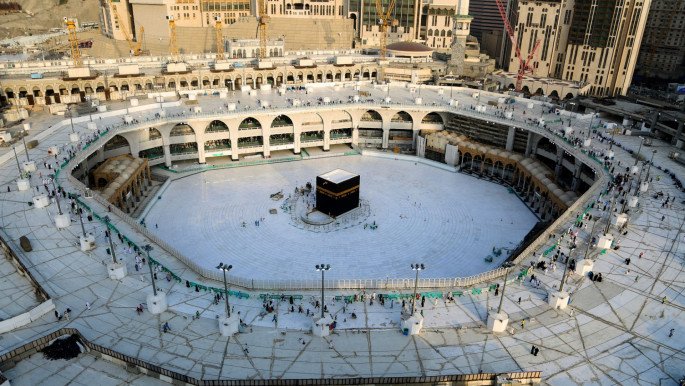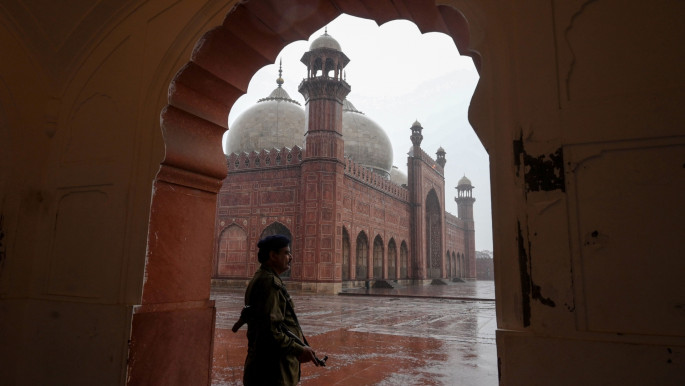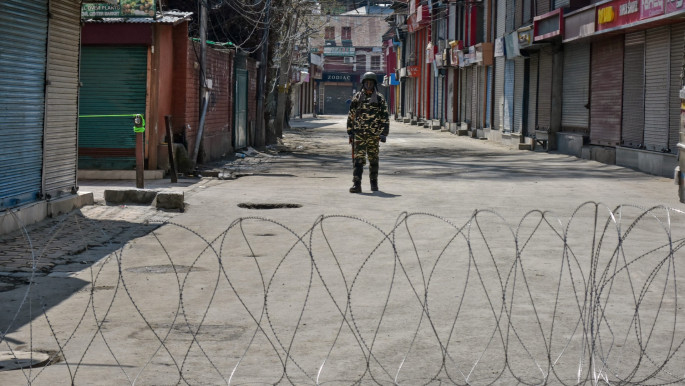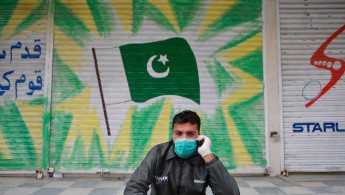Pilgrims and pandemics: Are religious groups undermining Pakistan's fight against Covid-19?
Awareness about what the coronavirus can do, how it can spread, and how it can be defeated.
A large religious gathering held last month by the Tablighi Jamaat - an Islamic missionary movement - the arrival of thousands of Shia Muslim pilgrims from Iran, violations of lockdowns by clerics to hold prayer congregations, and the government's incompetence, are the key reasons behind Pakistan's phenomenal surge in Covid-19 cases.
Pakistan is at war with the Covid-19 pandemic with inadequate health care facilities, a cash-strapped government and perennial governance issues.
The country recorded its biggest surge in coronavirus infections this month, taking the tally to over 4,322 amid reports of ineffective quarantine procedures and the deaths of 63 coronavirus victims.
Some religious groups are still reluctant to restrict prayer congregations five times a day at mosques in the country and they continue to violate lockdown measures.
Last month, Pakistani authorities, after consultation with clerics from all schools of thought, restricted prayer congregations at mosques in order to prevent the spread of infection.
 |
|
Authorities enforced a strict lockdown across the country to restrict Friday prayer congregations with an aim to curb the further spread of the virus.
Despite the lockdown, some local clerics in some areas of the country still led the Friday congregational prayers. For instance, a prayer leader in the Liaqatabad area of Karachi port city instigated a mob that manhandled police personnel on 3 April.
Heavy contingents of police and other law enforcement personnel were deployed outside mosques in Karachi and other districts of Sindh province to prevent people from congregating for Friday prayers.
The lockdown measures and restrictions on congregational prayers were, however, largely followed throughout the province.
Spread of infection in the country is also linked to the religious gathering of Tablighi Jamaat held near Lahore, and attended by thousands of people last month.
The authorities are still trying to track down some 41,000 people who attended the large religious congregation.
Read more: Should Muslim Friday prayers be cancelled to fight coronavirus?
About 4,500 people who attended the congregation were foreigners from 26 different countries. The annual congregation was to be held from 10 March to 15 March.
Pakistani authorities asked to call it off in the wake of the pandemic. People, however, still gathered near Lahore for two days before the event was cancelled.
 |
Pakistan is at war with the Covid-19 pandemic with inadequate health care facilities, a cash-strapped government and perennial governance issues |  |
In the Sindh province, some 94 Tablighi workers tested positive. The Sindh authorities have turned a total of 168 Tablighi Jamaat centres across the province into quarantine centers where thousands of preachers have been isolated to prevent the spread of Covid-19.
Some 8,000 preachers have been quarantined in Punjab province. At least 17 members of the Tablighi Jamaat tested positive in Islamabad, including six who were from Kyrgyzstan and two Palestinian nationals.
Read more: Muslim authorities suspend traditional funeral rites to bury coronavirus 'martyrs'
Critics however say that authorities are engaged in a propaganda campaign against the peaceful Tablighi workers to cover up their incompetence and insufficient measures to check the spread of virus.
They contend that authorities are covertly shifting the confirmed Covid-19 patients to centres where Tablighi workers have already been kept in quarantine in order to put the blame on workers for carrying the virus.
The Covid-19 cases began to climb with the influx of Pakistani pilgrims into the country from Iran last month. The country's southwestern Balochistan province shares a 1,000 kilometer-long border with Iran.
 |
|
| Pakistani authorities have enforced a lockdown across the country to restrict Friday prayer congregations. [Getty] |
Taftan is the main crossing point at the Pakistan-Iran border in Balochistan. Every year, a few thousand people belonging to the minority Shia community travel to Iran for pilgrimage.
In the wake of the pandemic in Iran, hundreds of Pakistani pilgrims returned home after Tehran did not allow the pilgrims to stay.
The country's confirmed cases of Covid-19 were mostly detected last month in people who went on pilgrimages to Iran.
Pakistani government set up camps in the border town of Taftan to keep some 2,000 pilgrims from Iran in quarantine for 14 days.
But how the pilgrims spent their quarantine period in Taftan camps is the story of mishandling, incompetence and negligence on the part of Pakistani authorities that spread the infection across the country.
At Taftan, both the healthy and infected pilgrims were kept together in tents and they were not separated. Quarantined pilgrims were kept in tents with extremely limited or no quarantine facilities.
 |
Imran Khan is not in favour of a complete lockdown in the country but at the same time has brought forth no effective strategy to fight the pandemic |  |
The mishandling and sheer negligence on the part of Pakistani authorities turned Taftan into another Wuhan, the Chinese city from where the coronavirus actually originated and spread across the world.
The sorry state of affairs at Taftan camps also showed that the Pakistani government was not prepared to cope with the situation despite the World Health Organisation's (WHO) declaration in January of a global health emergency after a coronavirus outbreak in China.
Read more: Pakistan searches for Muslim pilgrims from mass gathering amid virus fears
The people from Taftan camps were shifted to quarantine sites in different cities of the country where poor quarantine facilities, unsanitary conditions and a lack of hygienic facilities are still the persistent problems.
Even the doctors and paramedical staff treating the Covid-19 patients lack basic equipment like masks and gloves.
 |
|
|
Read more: Emerging from brutal Indian clampdown, Kashmir |
The lack of seriousness, both on the part of the government and the people in general, in fighting the novel coronavirus is leading to a surge in cases on a daily basis.
Hence, awareness is the first line of defence in the war against the coronavirus pandemic in Pakistan.
The lockdown in the country is playing havoc with the lives of millions of daily wagers, poor and deprived sections of society.
While poverty, unemployment and hunger already stare the South Asian nation in the face, the coronavirus outbreak is adding fuel to the fire.
In his several addresses to the nation, Prime Minister Imran Khan admitted that Pakistan does not have the capability and resources to grapple with the novel coronavirus pandemic.
He asked the international community to consider writing off loans to developing countries such as Pakistan to help them deal with the crisis.
Khan is not in favour of a complete lockdown in the country, but at the same time has brought forth no effective strategy to fight the pandemic.
Syed Fazl-e-Haider is a contributing analyst at South Asia desk of Wikistrat. He is a freelance columnist and the author of several books including the 'Economic Development of Balochistan'


![President Pezeshkian has denounced Israel's attacks on Lebanon [Getty]](/sites/default/files/styles/image_684x385/public/2173482924.jpeg?h=a5f2f23a&itok=q3evVtko)



 Follow the Middle East's top stories in English at The New Arab on Google News
Follow the Middle East's top stories in English at The New Arab on Google News


